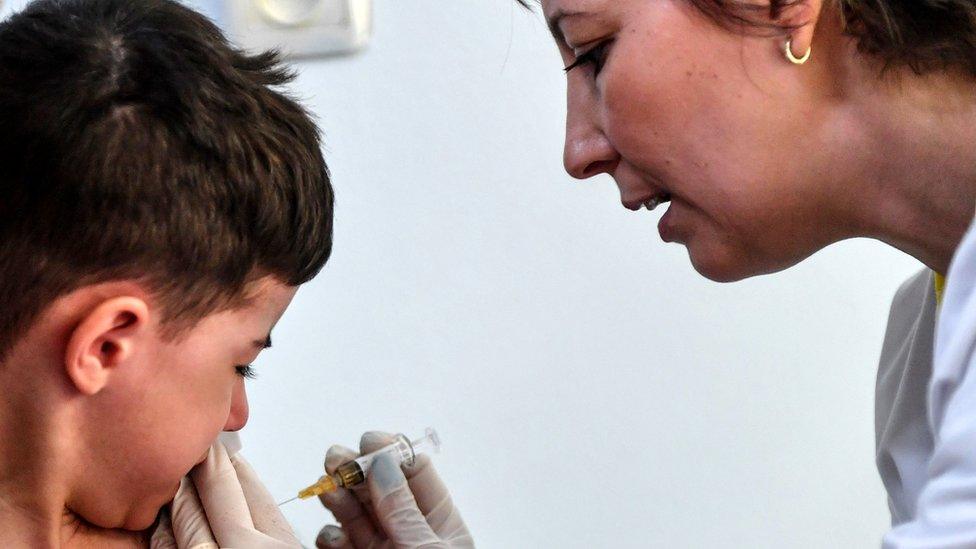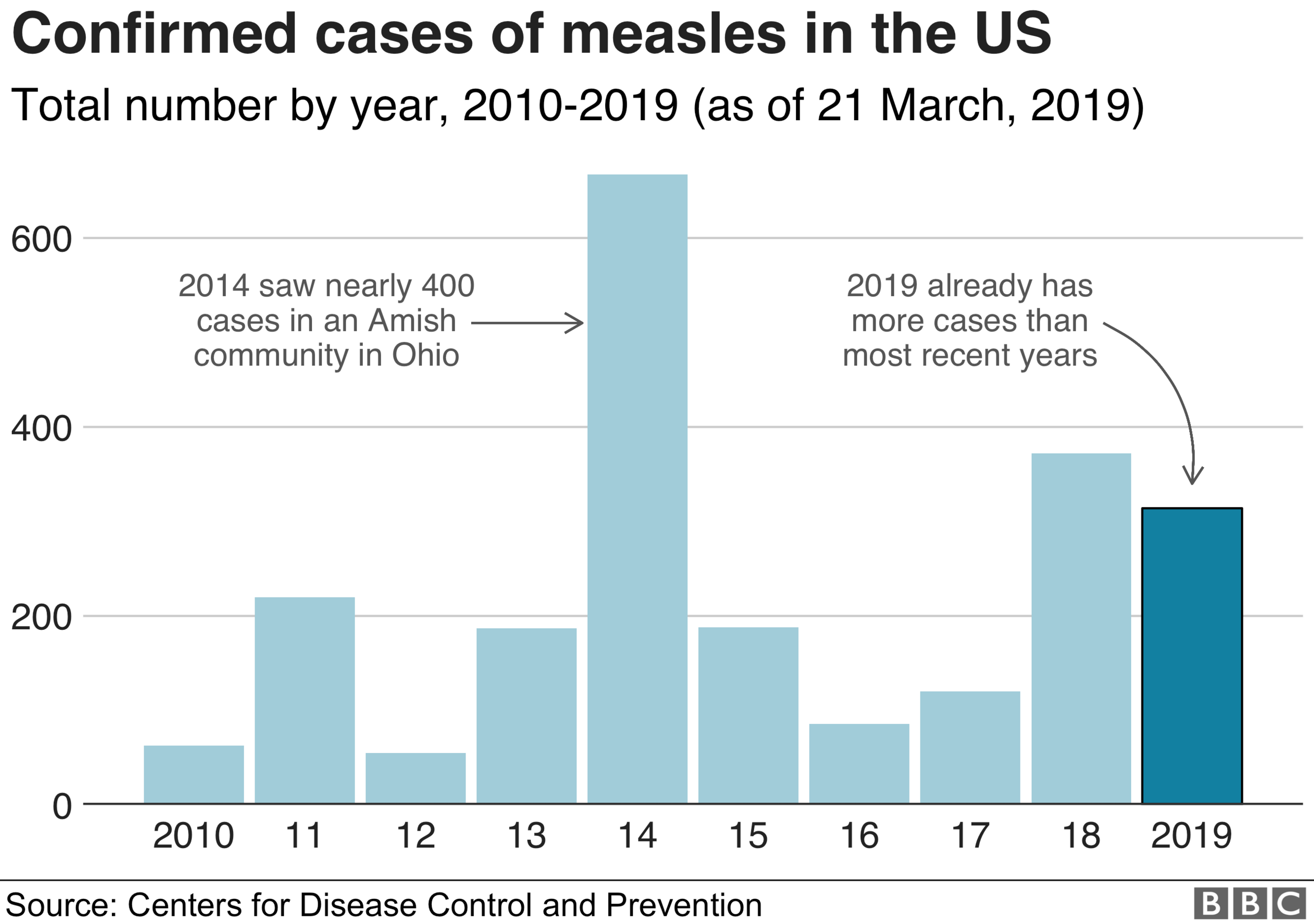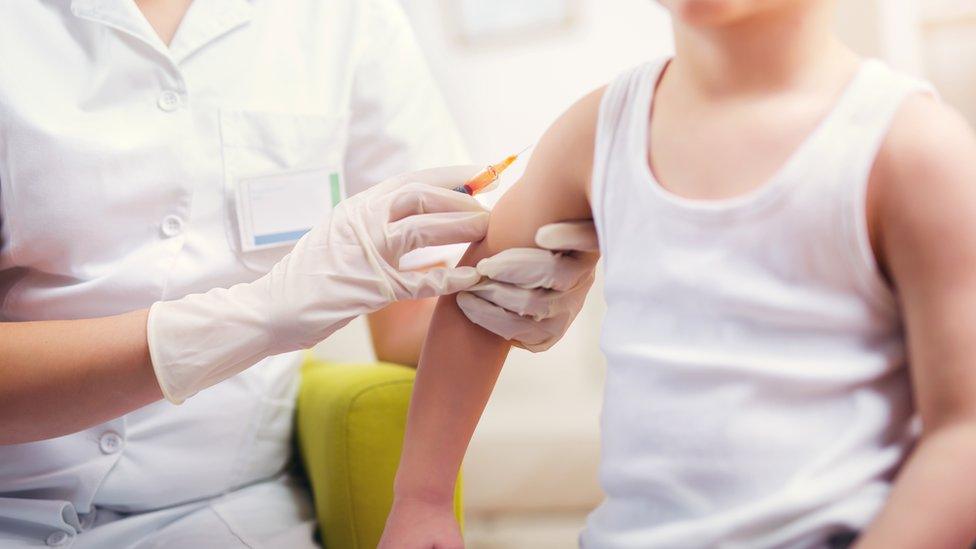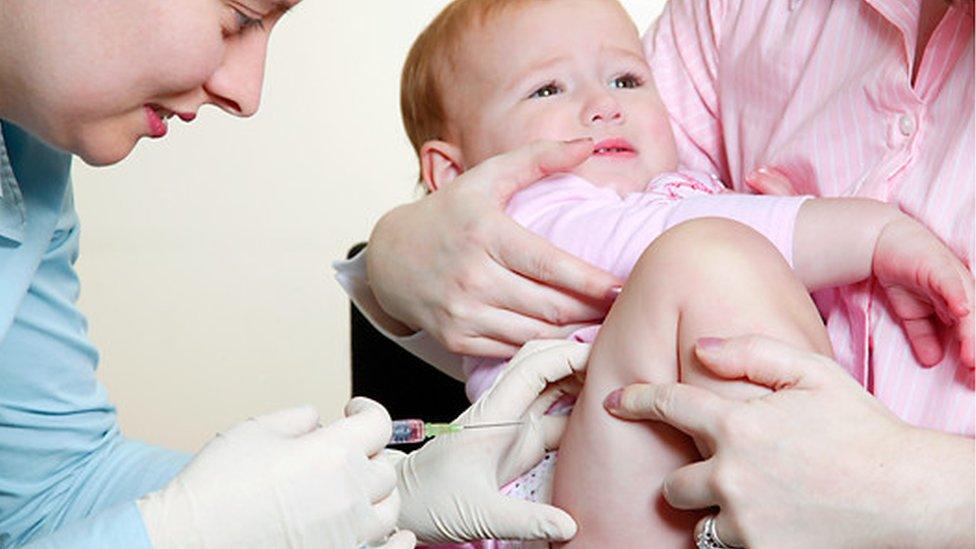New York county declares measles outbreak emergency
- Published

Despite the dangers, vaccination rates for measles are declining in many countries
A county in New York state has declared a state of emergency following a severe outbreak of measles.
Rockland County, on the Hudson river north of New York City, has barred unvaccinated children from public spaces after 153 cases were confirmed.
Violating the order will be punishable by a fine of $500 (£378) and up to six months in prison.
The announcement follows other outbreaks of the disease in Washington, California, Texas and Illinois.
BBC health correspondent Smitha Mundasad explains the US measles outbreak
Vaccination rates have dropped steadily in the US with many parents objecting for philosophical or religious reasons, or because they believe discredited information that vaccines cause autism in children.
"We will not sit idly by while children in our community are at risk," Rockland County Executive Ed Day said.
"This is a public health crisis and it is time to sound the alarm."
Why has this county taken action?
The outbreak in Rockland County is largely concentrated in the ultra-Orthodox Jewish community, the New York Times reported, external. It is believed it could have spread from other predominantly ultra-Orthodox areas around New York which have already seen outbreaks of measles.
Mr Day said health inspectors had encountered "resistance" from some local residents, which he branded "unacceptable and irresponsible".
"They've been told 'We're not discussing this, do not come back' when visiting the homes of infected individuals as part of their investigations," he said.


According to the CDC, external, there are 314 cases of measles currently reported in the US, with nearly half of those coming from Rockland County.
Dylan Skriloff, the editor of local newspaper the Rockland County Times, told the BBC the number of measles cases in the county had been increasing steadily in recent weeks.
"The first reports came six months ago, and each week we've had a new report with increased numbers," he said.
"It's become clear that it's not abating, and the authorities... don't want to accept [this reality] as the new normal."
Skriloff said that the authorities had been making "steady progress" in encouraging religious communities to immunise children but communication had broken down in the last month.
"The rate of immunisation in the religious communities, for young people, it's about 50%-60%, which is not nearly enough."
Officials said the order, which bans anyone under the age of 18 who has not been vaccinated from places such as schools, shopping centres, restaurants and places of worship, would come into effect at midnight on Wednesday and last 30 days.
However, the order notes that authorities "will not be patrolling or asking for vaccination records", just referring those found to violate the order to the District Attorney's Office.
Some critics say that without a plan to enforce the order, it is a useless measure that fails to protect anyone, while others have accused the local government of overreach.
Rockland County has a population of more than 300,000.

Why are there so many outbreaks?
By James Gallagher, health and science correspondent, BBC News
Both Europe and the US are dealing with outbreaks of measles, but why now?
Nothing has changed about the virus; the answer instead lies in human behaviour.
Myths about the vaccine causing autism have been debunked but are still affecting the number of children being immunised. And complacency from a generation of parents unfamiliar with the dangers of measles has also had an effect.
So with every year that goes by, the total number of unvaccinated people grows, often in pockets in some communities. It is like an ever-growing tinderbox just waiting for a spark.
Measles still runs rampant in many parts of the world - it kills around 90,000 people a year, external. All it takes is a bit of travel for measles to reach those vulnerable pockets and spread like wildfire.

What has happened elsewhere with measles vaccinations?
Measles is a highly infectious disease and can cause serious health complications, including damage to the lungs and brain.
But despite the dangers, vaccination rates are declining in many countries.
There have also been outbreaks of measles in Europe
In the UK, the government is seeking new legislation to force social media companies to remove content promoting false information about vaccines.
There were more than 82,500 cases in Europe in 2018 - the highest number in a decade and three times the total reported in 2017.
The World Health Organization has declared the anti-vaccine movement to be one of the top global health threats for 2019.

Have you been affected by the order put in place? What is your reaction? You can share your views by emailing haveyoursay@bbc.co.uk, external
Please include a contact number if you are willing to speak to a BBC journalist. You can also contact us in the following ways:
WhatsApp: +44 7555 173285
Tweet: @BBC_HaveYourSay, external
Text an SMS or MMS to 61124 or +44 7624 800 100
Please read our terms of use and privacy policy
- Published26 March 2019

- Published7 February 2019
